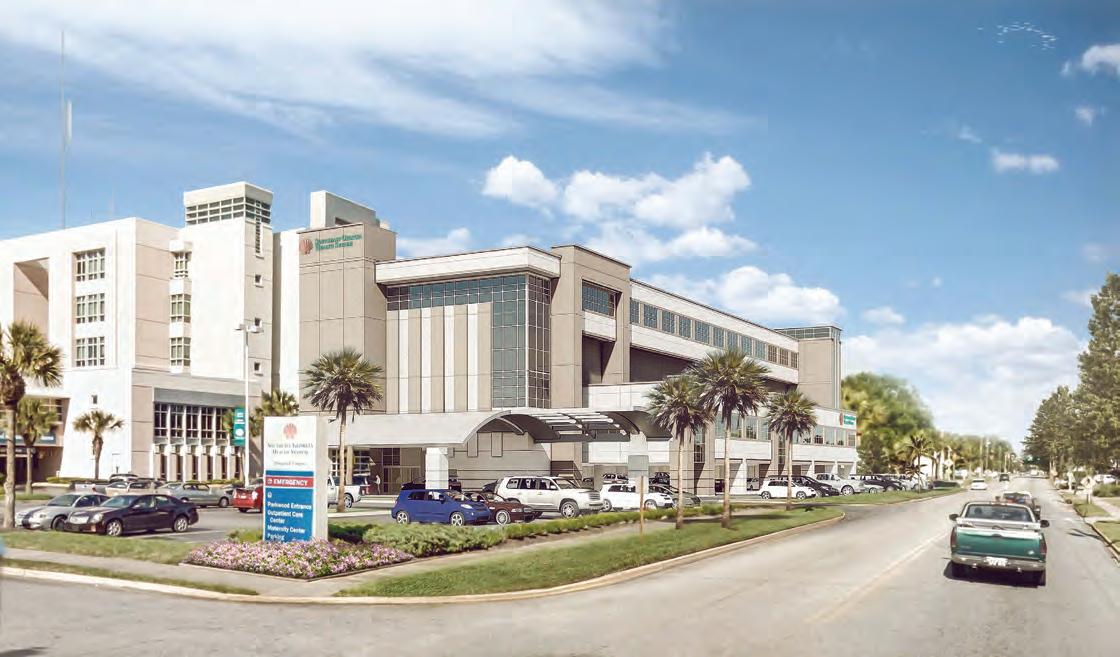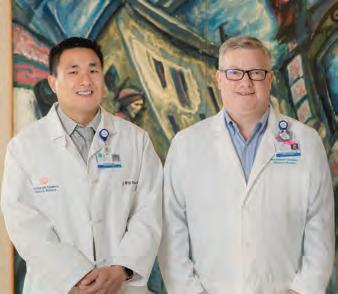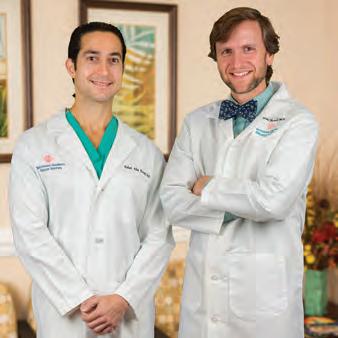
6 minute read
Southeast Georgia Health System: Advances in Medicine
Southeast Georgia Health System - Brunswick Campus
Advertisement
With campuses in Brunswick and Camden, Southeast Georgia Health System (SGHS) is the premier source of comprehensive healthcare in Southeast Georgia. The Health System has served residents and visitors for well over a century in Brunswick, and through the years has expanded services throughout the region with locations in Brantley, Camden, Charlton, Glynn, McIntosh and Wayne counties. As the communities it serves grows, the Health System’s commitment to meeting their healthcare needs remains strong. In addition to launching a new expansion of its Brunswick Campus Emergency Care Center and Surgical Services, the Health System continues to progress and expand with new procedures, technologies and physicians to meet healthcare needs now and for future generations.
LINX Reflux Management System
Providers at SGHS utilize the most cutting-edge technology and processes to treat patients with conditions such as gastroesophageal reflux disease (GERD). Acid reflux has typically been managed with medications, specifically PPIs, which only reduce the discomfort of reflux by shutting down acid production in the stomach. GERD is actually a mechanical disease, where changes in the lower esophageal sphincter, also referred to as LES, allow stomach contents to flow upward into the esophagus. It is also a progressive disease, and patients tend to need higher doses of medications over time.
According to a study published in the U.S. National Library of Medicine, more than 81 million people are dependent upon proton-pump inhibitors (PPIs), medications used to relieve GERD symptoms. This statistic is alarming given that recent studies have uncovered serious health concerns associated with long term PPI use; however, thanks to advancements in surgical technology, GERD sufferers now have a treatment option available to them that actually has the potential to cure their GERD.
A cutting-edge option for the treatment of GERD is the LINX Reflux Management System, also expertly performed at SGHS. The first procedure was performed in December 2018, by board-certified surgeons Vincent K. Arlauskas, M.D. and J. William Tsai, M.D. of Southeast Georgia Physician Associates–Glynn General & Vascular Surgery. The LINX procedure uses a flexible ring about the size of a quarter. Made of magnetic beads, this ring is surgically implanted around the esophagus just above the stomach. Once it’s placed, the device strengthens the sphincter and prevents reflux. The surgery does not alter the stomach anatomy and because the device is flexible, it allows normal bodily functions, such as belching and vomiting. This differs from Nissen fundoplication, the traditional GERD surgery, which restricts some bodily functions. LINX may also help reduce gas and bloating. If the patient has a hiatal hernia, the surgeon repairs the hernia before implanting the ring. The LINX procedure requires general anesthesia and takes about an hour. Most patients go home after one night in the hospital and resume their normal routine and diet within a few days. In fact, many enjoy foods they previously couldn’t tolerate with GERD. The device is designed to last a lifetime, but if it needs to be removed for any reason, revision surgery takes less than an hour.
Dr. J. William Tsai and Dr. Vincent K. Arlauskas Dr. Rafael Alba Yunen and Dr. Kevin Fussell Unfortunately, chronic reflux and medications to manage GERD can lead to serious health issues. Short term, reflux affects what and when a patient eats, their voice, sinuses and how well they sleep. Over time, damage from stomach acid can lead to esophageal cancer. Proton Pump Inhibitor (PPI) drugs to control GERD aren’t a good long-term solution, since they leach important nutrients from the body, increasing a patient’s risk of osteoporosis. It’s also thought that PPIs could cause kidney and coronary disease. “Often when I meet patients for the first time, they don’t know that there are other options beyond medication,” says Dr. Tsai. “You don’t have to be on PPIs for life, and there’s no need to travel to larger cities for care. We now have cutting edge endoscopic and surgical GERD solutions available right here in the Golden Isles.” According to Dr. Arlauskas, the first steps toward relief are simple. “We try all the conservative measures first – diet, lifestyle modifications, medication. If reflux persists, patients are screened with an endoscopy, pH testing and manometry to determine if they qualify for surgery. These tests measure acidity levels as well as the health of the esophagus.”


symptoms.” With reflux resolved, patients are surprised how much better life can be. “A middleaged patient of mine had hernia repair many years ago. When she began experiencing reflux and pain again, I converted her fundoplication into a LINX. Two months later, she had no pain, no reflux and she’s off medication,” says Dr. Arlauskas.
Asthma Advancements
The increase in the number of individuals living with asthma has nearly doubled over the past few decades, according to the National Health Interview Survey, and Southeast Georgia is no exception. But, thanks to recent scientific breakthroughs, there’s a new procedure that has the potential to dramatically improve the quality of life for people who have trouble controlling their asthma.
The procedure, called bronchial thermoplasty, uses a tiny heating element to destroy some of the muscle tissue in the airway that contracts during an asthma attack. With less muscle to close the airway, attacks are less frequent and less severe.
Bronchial thermoplasty has the potential to dramatically improve the quality of life for millions of people who are tired of fighting a never-ending battle to simply breathe. In fact, a recent study has shown that
those who undergo bronchial thermoplasty experience an average of 32 percent fewer severe attacks, 84 percent fewer emergency room visits, and 66 percent less time lost from work, school or other daily activities due to asthma symptoms. SGHS has always been a leader in making sure the community has access to the newest and most advanced procedures and offering bronchial thermoplasty for asthma patients is just the latest example. “If you or someone you love is having difficulty with asthma,” says Kevin Fussell, M.D. “it’s definitely worth talking to your doctor, or seeing a specialist about whether or not bronchial thermoplasty may be an option.” Trained by one of the country’s leading experts in bronchial thermoplasty procedures, Dr. Fussell says that although the airway may be temporarily irritated after the procedure, which can cause an increase in flare-ups, the procedure is quick, painless and virtually risk-free. “We do three separate treatments, three weeks apart, to allow the airway time to heal in between,” explains Dr. Fussell. “It’s a minimally invasive outpatient procedure, and each treatment only lasts about “SGHS has always been a leader in making sure the community has access to the newest and most advanced procedures and offering bronchial thermoplasty for asthma patients is just the latest example.”
30 minutes. It is done under general anesthesia, so patients may feel the effects of the sedation for a few hours, but there have been almost no reports of pain, discomfort or other side effects.”
Dr. Fussell explains that the results will be different for everyone and it may take three to five months to see the full benefits, but that for many, the procedure can be life-changing, especially when medications aren’t working.










